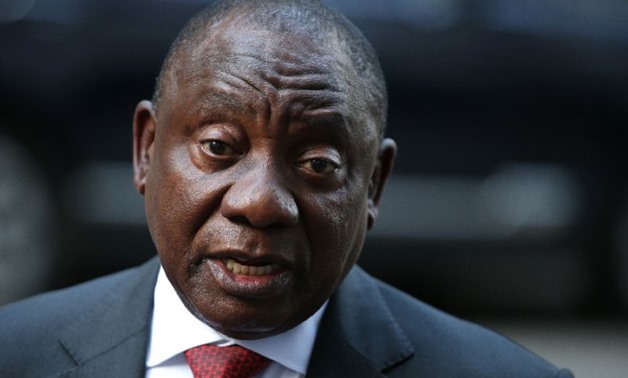
Ramaphosa, who took office in February with promises to jump-start the economy and stamp out graft, had been attending the Commonwealth Heads of Government Meeting in London this week (AFP Photo/Daniel LEAL-OLIVAS)
20 April 2018: South African police on Friday fired rubber bullets at protesters after President Cyril Ramaphosa cut short a foreign trip to deal with violent riots over alleged government corruption and poor public services.
Shops were looted, roads were blocked and vehicles set alight in North West province in unrest that posed an early challenge for Ramaphosa, who came to power in February.
At least 23 people were arrested and one man was reported to have died in sporadic violence that erupted this week in Mahikeng, the provincial capital.
Ramaphosa called for calm as he vowed to speedily resolve the cause of the unrest, following more than six hours of talks with local leaders in the city of Mahikeng after he cut short his trip to a Commonwealth summit in London.
Violent protests are common in South Africa, but North West province has been a hotbed of unrest due to boiling frustration over lack of housing, health services and jobs.
Police fired rubber bullets as protesters hid behind cardboard sheets, while roads were littered with burning tyres and bricks that had been thrown through the air.
- 'Violence and anarchy' -
At the end of the talks Ramaphosa appealed for an end to the unrest, promising a "speedy" resolution of the crisis.
"...let us be calm, let us return to a position of normalcy as we address this matter and reach finality on it," he said in an address broadcast live from the city.
He said he had been made to understand during the talks that the unrest had been sparked by concerns over the position of the provincial premier, corruption and governance.
"These are matters that are serious enough" to warrant broad consultation in the party and the national government "on an urgent basis", he said.
"We are going to act as speedily as possible to address each of the issues that have been raised," he added.
The trigger for the unrest was reportedly the death on Tuesday of two patients at a health clinic that was closed due to a month-long dispute over health workers' salaries and contracts.
Much of the anger has been directed at Supra Mahumapelo, the provincial premier, who is accused of involvement in graft scandals that have engulfed the ruling ANC (African National Congress) party.
The border to neighbouring Botswana was closed due to the violence, while schools, shops, offices and government services across North West province were shut.
Local residents said foreign-owned shops were the first to be targeted by looters.
"Very poor people are in dire need. Those people looted foreigners' shops," local resident Leveticus Molosankwe, 43, told AFP.
"They have taken advantage of the political situation as people plead for the removal of Mahumapelo. This has been simmering for months."
Thapelo Galeboe, member of the local Communist Party branch, said the premier ruled "like an emperor" in the province.
"The health system has completely collapsed. Hospitals are filthy. Families close to the premier have benefited in a very corrupt manner from tenders," he said.
- New leadership -
Ramaphosa, who took over as leader of the ruling ANC in December, replaced Jacob Zuma as national president earlier this year.
Zuma's nine-year tenure saddled South Africa with weak growth, ballooning national debt, depressed investor confidence and record unemployment.
The ANC forced Zuma from office in February largely due to his mounting legal challenges and multiple corruption scandals, and the party has distanced itself from its former leader.
Ramaphosa has vowed to crack down on government corruption, which he has admitted is a serious problem, and improve South Africa's ability to attract foreign investment.
Unemployment is at a record high of about 28 percent, with youth unemployment reaching over 50 percent in many areas.
Zuma appeared in court earlier this month at a preliminary hearing on graft charges that he denies.


Comments
Leave a Comment